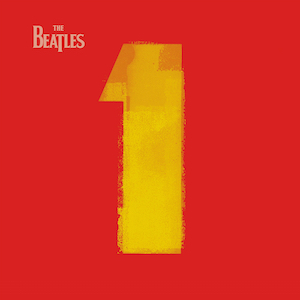
1 is a greatest hits album of the English rock band the Beatles, originally released on 13 November 2000. The album features virtually every number-one single the band achieved in the United Kingdom or United States from 1962 to 1970. Issued on the 30th anniversary of the band's break-up, it was their first compilation album available on only one CD. 1 was a commercial success and topped charts worldwide. It has sold over 31 million copies.

Worldwide, the British rock band the Beatles released 12 studio albums, 5 live albums, 51 compilation albums, 36 extended plays (EPs), 63 singles, 17 box sets, 22 video albums and 53 music videos. In their native United Kingdom, during their active existence as a band, they released 12 studio albums, 1 compilation album, 13 EPs, and 22 singles. The early albums and singles released from 1962 to March 1968 were originally on Parlophone, and their albums and singles from August 1968 to 1970 were on their subsidiary label Apple. Their output also includes vault items, remixed mash-ups and anniversary box-sets.

Endless Summer is a compilation album by American rock band the Beach Boys, released on June 24, 1974. A collection of hits from the band's 1962–65 period, Endless Summer was compiled by their old label, Capitol Records, following the success of the film American Graffiti, in which several songs were featured. It revitalized the band's popularity after years of lukewarm sales, but also inspired nostalgia for the Beach Boys' early surfing and hot rod-themed music, repositioning the group as an oldies act.
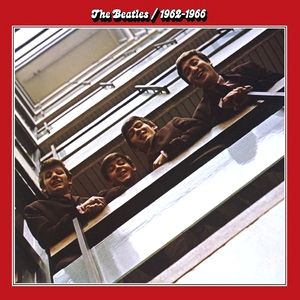
1962–1966, also known as the Red Album, is a compilation album of songs by the English rock band the Beatles, spanning the years indicated in the title. Released with its counterpart 1967–1970 in 1973, the double LP peaked at number 3 in the United Kingdom. In the United States, it topped the Cash Box albums chart and peaked at number 3 on the Billboard Top LPs & Tape chart while 1967–1970 reached the top spot. The album was re-released in September 1993 on compact disc, charting at number 3 in the UK.
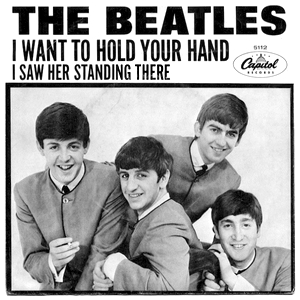
"I Want to Hold Your Hand" is a song by the English rock band the Beatles, written by John Lennon and Paul McCartney. Recorded on 17 October 1963 and released on 29 November 1963 in the United Kingdom, it was the first Beatles record to be made using four-track recording equipment.

Hey Jude is a 1970 collection of non-album singles and B-sides by the Beatles. Originally released in the United States and various other markets, but not in the United Kingdom, it consists of non-album singles and B-sides not previously issued on an American Beatles LP; this includes "I Should Have Known Better" and "Can't Buy Me Love", two singles released by Capitol Records whose only previous American album appearance had been on the A Hard Day's Night soundtrack album, which had been released by United Artists Records. The Hey Jude LP has been out of print since the late 1980s, although it remained available on cassette during the 1990s. The album was issued on CD for the first time in 2014, as an individual release and in a box set titled The U.S. Albums. It is named after the Beatles' longest-running No. 1 single "Hey Jude", itself the seventh track of the compilation.

"From Me to You" is a song by the English rock band the Beatles that was released in April 1963 as their third single. It was written by John Lennon and Paul McCartney. The song was the Beatles' first number 1 hit on what became the official UK singles chart but the second, after "Please Please Me", on most of the other singles charts published in the UK at the time. "From Me to You" failed to make an impact in the United States at the time of its initial release. Instead, a 1963 cover version released by Del Shannon resulted in the song's becoming the first Lennon–McCartney track to enter the US pop charts. The Beatles' original was re-released in the US in January 1964 as the B-side to "Please Please Me", and reached number 41.
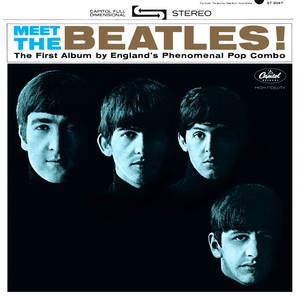
Meet the Beatles! is a studio album by the English rock band the Beatles, released as their second album in the United States. It was the group's first American album to be issued by Capitol Records, on 20 January 1964 in both mono and stereo formats. It topped the popular album chart on 15 February 1964 and remained at number one for eleven weeks before being replaced by The Beatles' Second Album. The cover featured Robert Freeman's iconic portrait of the Beatles used in the United Kingdom for With the Beatles, with a blue tint added to the original stark black-and-white photograph.
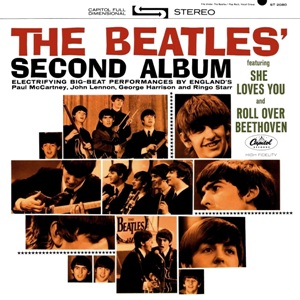
The Beatles' Second Album is the second Capitol Records album by the English rock band the Beatles, and their third album released in the United States including Introducing... The Beatles, which was issued three months earlier by Vee-Jay Records. Following its release in April 1964, The Beatles' Second Album replaced Meet the Beatles! at number 1 on the Billboard Top LPs chart in the US. The album was compiled mostly from leftover tracks from the UK album With the Beatles and the forthcoming UK Long Tall Sally EP, which are predominantly rock and roll and R&B covers, and rounded out with several Lennon-McCartney-penned non-album b-sides and the hit single "She Loves You". Among critics, it is considered the band's purest rock and roll album and praised for its soulful takes on both contemporary black music hits and original material.

Introducing... The Beatles is the first studio album released by the English rock band the Beatles in the United States. Originally scheduled for a July 1963 release, the LP came out on 10 January 1964, on Vee-Jay Records, ten days before Capitol's Meet the Beatles! The latter album, however, entered the U.S. album chart one week before the former. Consequently, when Meet The Beatles! peaked at No. 1 for eleven consecutive weeks, Introducing...The Beatles stalled at No. 2 where it remained for nine consecutive weeks. It was the subject of much legal wrangling, but ultimately, Vee-Jay was permitted to sell the album until late 1964, by which time it had sold more than 1.3 million copies. On 24 July 2014 the album was certified gold and platinum by the RIAA.

Rock 'n' Roll Music is a compilation album by the English rock band the Beatles containing previously released tracks. It was issued on 7 June 1976 in the United States, on Capitol Records, and on Parlophone in the United Kingdom, four days later. A double album, the 28-track compilation includes 15 Lennon–McCartney songs, one George Harrison composition ("Taxman"), and a dozen cover versions of songs written by significant rock and roll composers of the 1950s, including Chuck Berry, Little Richard, Carl Perkins and Larry Williams. Not counting the 1971 Spanish compilation album, Por Siempre Beatles, Rock 'n' Roll Music was the first Beatles album to include "I'm Down", which had previously only been available as the B-side of the "Help!" single.
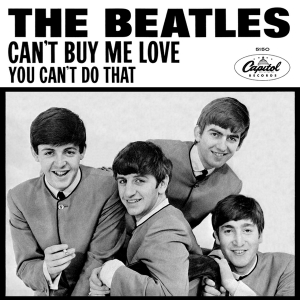
"Can't Buy Me Love" is a song by the English rock band the Beatles that was released in March 1964 as the A-side of their sixth single. It was written by Paul McCartney and credited to the Lennon–McCartney partnership. The song was included on the group's album A Hard Day's Night and was featured in a scene in Richard Lester's film of the same title. The single topped charts in the United Kingdom, the United States, Australia, Ireland, New Zealand, South Africa, the Netherlands, France and Sweden. In the UK, it was the fourth highest selling single of the 1960s.

Spirit of America is a compilation album by the American rock band the Beach Boys. The follow-up to the compilation Endless Summer (1974), it was released on April 14, 1975, by Capitol Records. Although it features only a handful of genuine hits, instead composed of album tracks from the band's early LPs, Spirit of America proved to be another success for the Beach Boys' former label, reaching No. 8 in the US during a chart stay of 43 weeks and going gold.

The Best of George Harrison is a 1976 compilation album by the English musician George Harrison, released following the expiration of his EMI-affiliated Apple Records contract. Uniquely among all of the four Beatles' solo releases, apart from posthumous compilations, it mixes a selection of the artist's songs recorded with the Beatles on one side, and later hits recorded under his own name on the other.
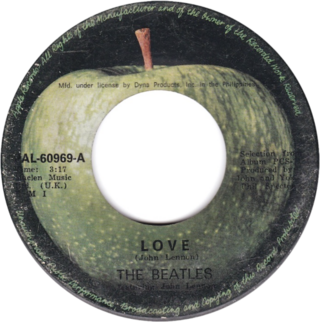
"Love" is a song written and performed by John Lennon, originally released on his debut solo album John Lennon/Plastic Ono Band (1970). The song's theme is more upbeat than most of the songs on Plastic Ono Band.
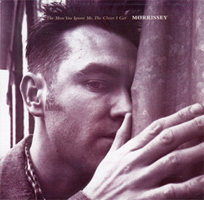
"The More You Ignore Me, the Closer I Get" is a song by English singer-songwriter Morrissey, co-written by Boz Boorer released as a single on 28 February 1994. It was taken from the then-unreleased Vauxhall and I album and was the first Morrissey single to be produced by Steve Lillywhite. The extra B-side "I'd Love To" features Kirsty MacColl on backing vocals.
The Beatles experienced huge popularity on the British record charts in early 1963, but record companies in the United States did not immediately follow up with releases of their own, and the Beatles' commercial success in the US continued to be hampered by other obstacles, including issues with royalties and public derision toward the "Beatle haircut".
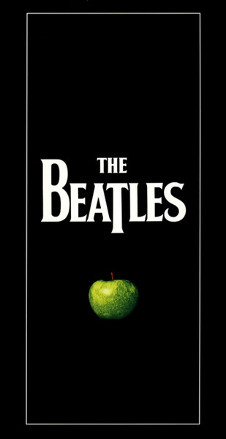
The Beatles (The Original Studio Recordings), also known as The Beatles: Stereo Box Set, is a box set compilation comprising all remastered recordings by English rock band the Beatles. The set was issued on 9 September 2009, along with the remastered mono recordings and companion The Beatles in Mono and The Beatles: Rock Band video game. The remastering project for both mono and stereo versions was led by EMI senior studio engineers Allan Rouse and Guy Massey. The Stereo Box also features a DVD which contains all the short films that are on the CDs in QuickTime format. The release date of 09/09/09 is related to the significance to John Lennon of the number nine.
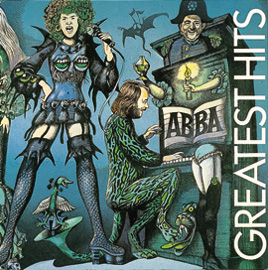
Greatest Hits is a compilation album by the Swedish pop group ABBA. It was originally released in Scandinavia on 17 November 1975 and in other parts of the world in 1976, notably the UK on 10 April, and on 18 September in the US and Canada. The 1976 version of the album included the band's most recent single "Fernando".
Rarities is the name of two separate and unrelated compilation albums by the English rock band the Beatles. The first was released in the United Kingdom in December 1978, while the second album was issued in the United States in March 1980.


















